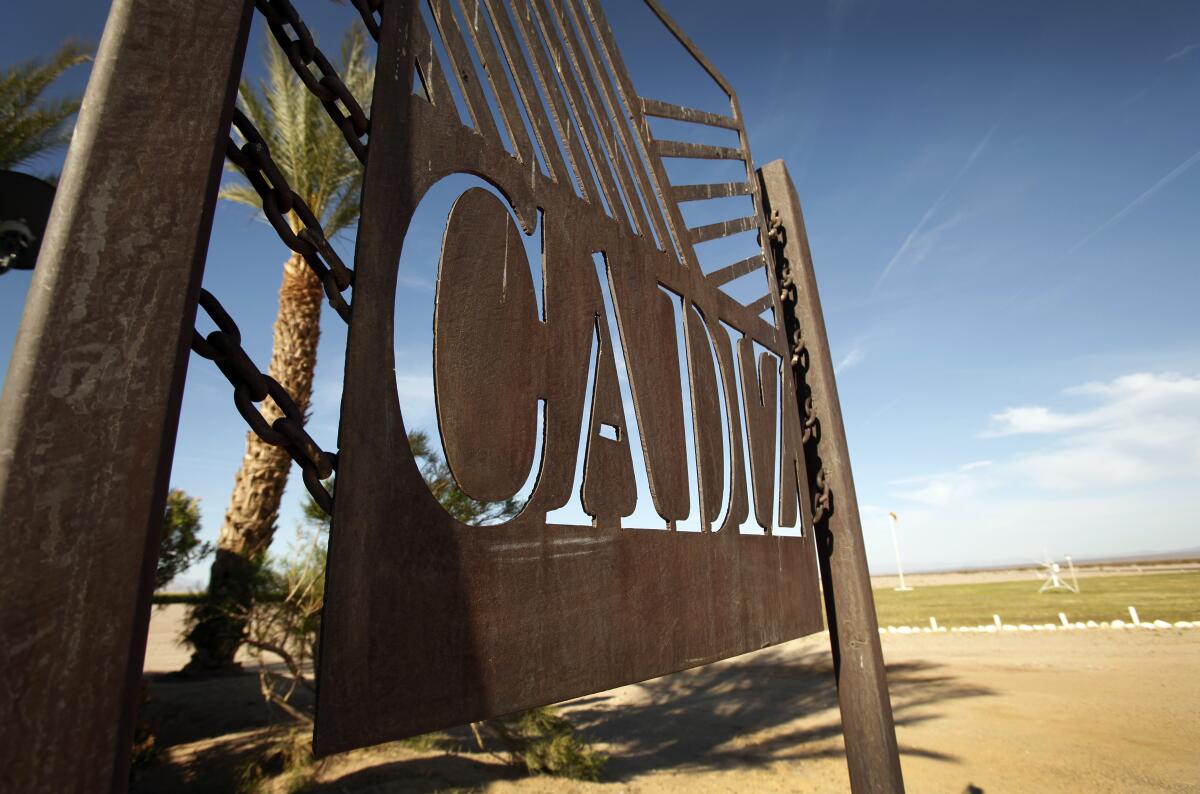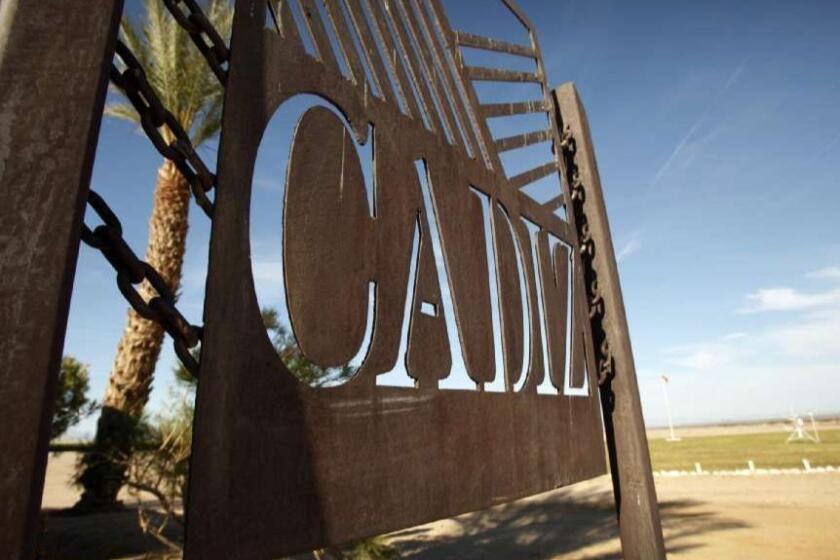Biden administration moves to scrap Cadiz water pipeline right-of-way permit, cleared by Trump

- Share via
Federal authorities have moved to reverse a Trump administration decision that cleared the way for Cadiz Inc. to pipe water across public land in the California desert.
The request filed in federal court Friday, which must still be granted, could deal a blow to the company’s decades-long effort to pump groundwater from beneath its desert property 200 miles east of Los Angeles and sell it to urban Southern California. The project is fiercely opposed by conservationists, who say it will dry up desert springs and seeps relied upon by Indigenous tribes and rare wildlife. Cadiz insists its plans won’t harm springs in the area.
“The Biden administration has taken the right step to stop this dangerous water grab that will destroy life-giving springs in the central Mojave Desert,” said Ileene Anderson, senior scientist with the Center for Biological Diversity. “It’s a really good thing for the desert, because it will keep the project from moving forward.”
The environmental group and others had filed multiple lawsuits challenging the project. The latest round, filed in March in U.S. District Court for the Central District of California, alleged the U.S. Bureau of Land Management last year fast-tracked the approval of a right-of-way permit for the pipeline without consulting with tribes or reviewing the potential impacts on natural and cultural resources, as required by law. They claim the move was an attempt to push through the decision in the final days of the Trump administration.
Attorneys for the federal government conceded as much Friday in a court filing in the lawsuits, whose plaintiffs also included Defenders of Wildlife, the Sierra Club, the Native American Land Conservancy and the National Parks Conservation Assn.
“Due to the lack of analysis, the [BLM] does not know the source of the water that will be transported through the pipeline and therefore could not have analyzed the potential impacts on the environment or historic properties of drawing down the water at its source,” they wrote. “Cadiz did not provide specific information about its plans, and the agency, nevertheless, proceeded to grant a right-of-way without knowing either the specifics of Cadiz’s plans or evaluating the potential impacts of Cadiz’s operations.”
Newsom signs a law blocking the controversial project from pumping groundwater from the Mojave Desert without approval from the State Lands Commission.
Citing the seriousness of the legal errors, the attorneys requested the court remand the BLM’s decision to issue the right-of-way, saying it had violated the National Environmental Policy Act and the National Historic Preservation Act. A hearing on the motion is scheduled for March 2022.
Officials for Cadiz Inc. could not be reached for comment.
The Biden administration’s move drew praise from environmental groups and tribal representatives.
“We thank the Biden administration for recognizing that tribal peoples in the California desert region depend greatly on their sacred ancestral lands and water sources for their spiritual and cultural practices and way of life,” Michael J. Madrigal, president of the Native American Land Conservancy, said in a statement. “The Trump administration excluded tribes in order to help Cadiz, but today’s decision respects that our peoples have been here since the beginning of time and today we continue to visit, gather, and utilize these special areas in the desert for our cultural survival.”
The ReBuild SoCal Partnership, a coalition of contractors that advocates for infrastructure work, said it was opposed to the motion, noting it came a day after the State Water Project announced it would deliver no supplies to districts across the state other than what is critically necessary.
“What has to happen for the federal government to understand how dire the situation is for thousands of people who don’t have access to clean, safe drinking water?” Jon Switalski, executive director of Rebuild SoCal, said in a statement.
If the court grants the request, Anderson said, the company still could come back and submit another application to use the right-of-way for a water pipeline.
“But I think that in the Biden administration, they would have a more critical eye in doing a much better job in an environmental review,” she said.
Cadiz has been trying to implement the controversial water extraction project on its land near the Mojave National Preserve for more than 20 years.
In 2019, environmental groups won a separate lawsuit challenging other Trump administration decisions that would have enabled the company to use an existing railroad right-of- way across federal land to pipe supplies from its proposed well field to the Colorado River Aqueduct.
A federal judge has struck down Trump administration decisions that cleared the way for Cadiz Inc. to build a water pipeline across public land in the California desert.
Cadiz had argued that it did not need to seek BLM permission to use the right-of-way for a water pipeline because it was furthering a railroad purpose. The BLM initially disagreed, saying in 2015 during the Obama administration that the company could not use the right-of-way and would have to obtain federal permission to run the 58-mile pipeline across surrounding federal land. But after Trump took office, a BLM official revoked legal guidances that underpinned the agency’s 2015 decision and subsequently gave Cadiz the green light to use the right-of-way.
Environmental groups challenged the agency’s about-face in court, winning a favorable ruling from U.S. District Judge George Wu, who said the BLM had failed to legally justify its reversal.
The project faced another hurdle after Gov. Gavin Newsom in August 2019 signed legislation requiring it to undergo scientific study and gain approval from the State Lands Commission.
Cadiz then decided to pursue a different route to the north that would extend to the California Aqueduct near Wheeler Ridge by purchasing an existing 220-mile oil and gas pipeline that could be converted to use for water. The company said the pipeline would improve underserved communities’ access to water.
Former Times staff writer Bettina Boxall contributed to this report.
More to Read
Sign up for Essential California
The most important California stories and recommendations in your inbox every morning.
You may occasionally receive promotional content from the Los Angeles Times.













